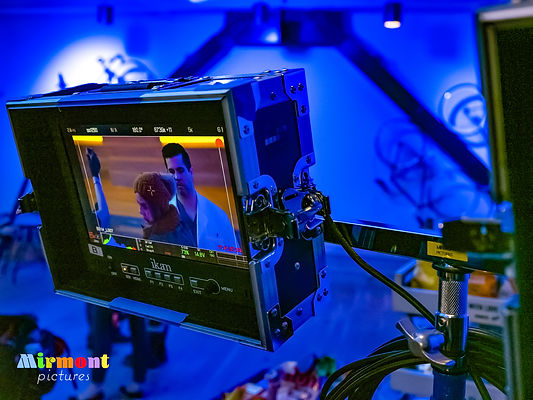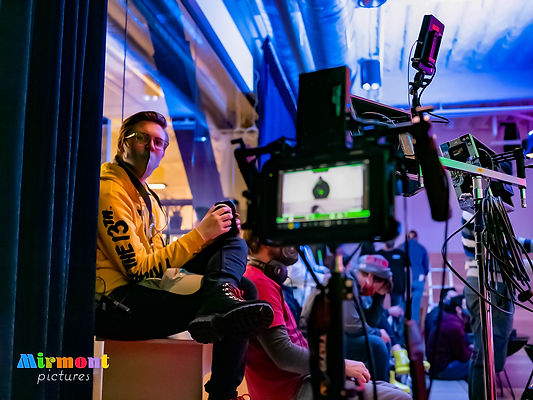INTRODUCTION
Being a Production Assistant is a weird test with only one question; Are you willing to become the best P.A. you can, even though you know you won’t be a P.A. forever?
Movie production teams are made of (mostly) specialists, and P.A.s do everything nobody else wants to do. Take pride in all the little demeaning tasks.
Be honored and happy to get coffee, and remember who likes three sugars. If you are an exceptional P.A., you will get promoted very quickly, and the coffee will come to you.
“Work like you are at the top. You are an indispensable part of the production team.”
THE
PRODUCTION ASSISTANT
HANDBOOK
"CODE OF THE P.A."
WRITTEN FOR FILM & TV CREW, SPECIFICALLY THE PRODUCTION ASSISTANT,
THE INFORMATION IN THIS BOOKLET CAN BENEFIT ANY INDIVIDUAL IN THE
MOTION PICTURE INDUSTRY.
WRITTEN BY CALEB CLARK
EDITED BY SOHRAB MIRMONT


SET ETIQUETTE 101
Never. Sit. Down.
P.A.s can't sit down because your job is to be ready to help anyone and everyone do anything, all the time. In the rare times you are unoccupied, you should stand, alert, with good posture, hands out of pockets, looking for something to do.
Communication
Communication on the set is as crucial as in a war. In fact you’ll notice a lot of similarities between a set and a military camp (except the death, guns and bad food.)
When people ask for something, make sure you understand or can find out exactly what it is they want. Be polite above all. The Universal Response to everything is, “I Understand”.
Always “Copy”
Never assume that a message has been received. It must be understood by person X that it is understood by person Y, so that both parties understand that both parties understand. Copy?
Remember Peoples’ Names
It's an important part of being a good P.A. Carry a crew list, or ask other people what someone’s name is before you call someone “dude”.
Anticipate
Anticipating what people will need can save you a lot of energy. It's the difference between figuring out what someone is sure to ask for and going to get it at your own pace, or suddenly being told to run and get it as soon as possible.
Run If Anybody Is Waiting
You never amble, cruise, saunter, lollygag, or stroll. Ever. If people are waiting for you make sure to hustle. On a set, you don’t want to actually run—there are too many things to knock or trip over and it stresses people out—but you do want to jog carefully.
Meals
You are low on the hierarchy, and low in line rights for food. Don't panic. You have rights to eat and you will, just not first.
Security
You may be asked to watch valuable equipment, sets, vehicles, or other gear. Your job is simple.
1. Never leave your post unmanned, not even for a nanosecond.
2. Do not fall asleep.
3. If anything happens, do not try and be a hero, just communicate using your radio or if it’s a real emergency, call 911.
Ask
Always ask before touching someone else's personal equipment. Err on the side of asking if you feel even the slightest tickle of an instinct that you should.
Respect
Some crew/departments may tease you, in a sporting, initiation kind of way. However, as with everyone, do not disrespect them. Stand up straight, be humble, ask a few questions, and generally keep your mouth shut until you get to know them.
Don’t Get Involved
Stay away from set soap operas, politics, and gossip. These things are dangerous and can get you fired no matter how good a worker you are.
Never Become Complacent
People will not usually tell you if you are doing a mediocre job, they will just never hire you again. It’s a good idea to ask your superiors if they are happy with your work and if there is anything that you can do better. Always try to do things better and faster
than the last time. Try new ways to do your job, and learn about other jobs.
Radio Etiquette
You're going to have to talk to people with it, and you’re going to have to communicate clearly.
Responding to calls using your name:
Always respond with, "Go for (your first name)."
Responding to Commands:
"Copy" is used to make sure people know that you heard and understood them. Silence just makes everybody nervous.
Channels
Radios have several channels. You should always be on the same channel as the Production staff unless otherwise instructed and keep
Radio Check
A radio check must be done when you arrive on set. If your walkie is working correctly, a crew member will respond with “Good check.”
Batteries
Also called “bricks.” PA’s must carry charged bricks so you have them when someone runs out. Generally you will clip two “hot bricks” to your belt.
Radio Lingo
“10-4," which is the same as “copy.” “20" which is related to location, as in, “What’s your 20?" “My 20 is..." You may also hear people use “10-1" or “10-100" for a bathroom break. Hopefully, “10-200" is obvious…
Lock-Downs
Your mission will be to guard the perimeter of the set from interruptions that would ruin the shot. You will be sent to a position near some kind of entrance to the set. You are to report back to your A.D. when you arrive in position. Then wait for the cue, "Rolling!" and yell it out loud and clear, making sure that anybody in your area can hear you. Now you are "Locked Down."
Once you're locked down and the camera is rolling, use the hand signal for rolling to tell any approaching people to stop, be quiet. The signal for rolling is pointing your index finger straight up and twirling it.
When the take is done, the A.D. will yell, "Cut," and maybe "Going again real soon," or “Break for 5," etc. Repeat what you hear loud and clear so people know what is going on.
Stunt/Star Crowd Control
During big stunts, or if a star needs room to work when there’s a big crowd, you may be asked to help with crowd control. The main thing to remember when you are assigned to crowd control is that no matter how cool the stunt, or attractive the actor, do not look at them. Stay focused on the crowd.
Running Talent
"Running talent," means shadowing cast members and knowing where they are and what they are doing so people can use you as a middleman to communicate with them.
When running talent or dealing with them in any way, it is your responsibility to make sure that they are content (within reason). Most of the time you should not let them know that you are “running” them.
Mistakes
You will screw up. What's important is how you handle yourself after it happens. Never make excuses when you screw up. Look everyone in the eye and take full responsibility.
As you climb the ladder and get more responsibility, you have to take the heat for mistakes that the people below you make. Remember, it is your fault if you were the leader, so take full responsibility and apologize. It is a signal to those above you that you can handle responsibility.

IN CLOSING
Arrive Early
We all have individual call times that must be our “Ready-To-Work” time. The saying is, “On-time is twenty minutes late.” Arrive before your call-time to make sure you are ready to work the moment you’re on the clock.
Radio-on
A great PA will arrive on set with his/her radio on. Upon stepping out of your car, you will do a Radio-Check to let the AD’s know you’re here.
Check-in With AD’s
You will first check in at the production trailer with the 2nd AD, then report to your duties / 1st AD on set.
Set Lingo
Here's some basic lingo good for a new P.A. to know:
Abby Singer: The second to last shot of the day.
Apple Box: Wooden crates that come in in 1⁄2, 1⁄4, and full sizes.
Best Boy: Second in command in the grip or gaffer departments.
C-47: It's just a wooden clothespin! Used to clip things to hot lights.
C-Stand: Metal stand with telescoping pole and Medusa like arms.
Call Sheet: The best-laid plans of the day’s actors and shots they are in
Continuity: Actors, prop and set consistency.
Craft Services: Vital food and drink.
Dolly: Rolling camera platform.
Extra or Background: Non-speaking background roles.
Gaff or Gaffers Tape: That which holds films together.
Gaffer: Electric and light department.
Grip: On set carpentry/construction.
Honey Wagon: Trailers on set, often for cast.
Jenny: Short for generator.
Key Grip: Head grip.
Striking: Said before turning on a set light to prepare people.
Lavalieres: Small mics that clip to actors collars. Also called, "Lapels."
Martini: Last shot of the day.
Video Village: On set video playback.
Wrangler: Manages extras, animals, etc. Not that extras are animals!
Wrap: The End. Help Production wrap. Secure equipment. Keep your walkie on until you leave set.

This is a great tool. Great resource for anyone starting out in the industry, whatever the capacity. Can make you look like a professional on your first day.